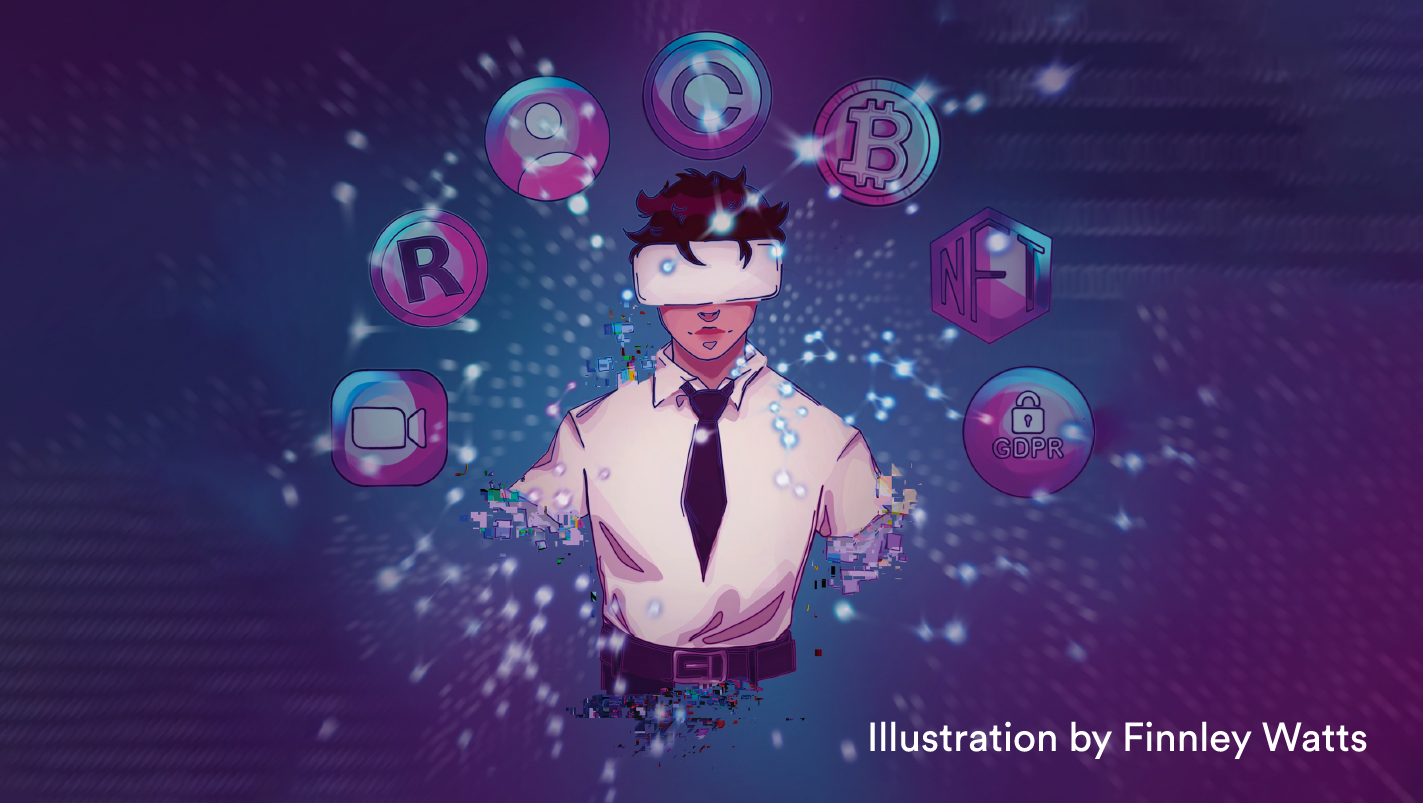Copyright in the metaverse
06.10.2022

Copyright aims to encourage, protect and reward creativity. Advocates of the metaverse claim it too provides a unique opportunity for creative expression, free as it is from the constraints of the physical world. On the face of it, the two seem well-aligned in their objectives.
In this sixth article of our series, we examine the role copyright may play in the metaverse and consider how rights holders can protect their copyright in a virtual world.
Creation and ownership of works in the metaverse
The Berne Convention and subsequent international copyright treaties require signatories (most countries are signatories) to provide copyright protection for literary and artistic works. In this context, literary works include computer programs. Original artistic works created in the metaverse, and computer programs (source and object code) running the metaverse, may therefore be copyright-protectable works.
You may therefore be wondering if the metaverse changes anything. How is this different from the internet? Viewed on one level, it is simply a case of applying well-established copyright principles in relatively new digital environments. However, if the anticipated proliferation of metaverses materialises, it seems inevitable that the ‘elasticity’ of copyright laws will be tested. For example, if a copyright protectable work is created by a large number of metaverse users in different parts of the world and is constantly being developed, determining authorship and ownership of copyright in that work at any given point in time is likely to be challenging (particularly in an “open metaverse”). The metaverse is likely to provide significant scope to create copyright-protectable works in ways unconstrained by the physics of the real world. Meta’s “Horizon Home” concept envisages individuals living and socialising in virtual homes that users have designed themselves.
The scope for creativity, and the ownership of copyright in the resultant works, will likely depend on the form of metaverse in question. In an “open metaverse”, such as Decentraland, users can build new elements into the metaverse, i.e. the platform is decentralised. Crucially, the rights in those elements typically remain with the users. “Open metaverse” platforms may require a licence to the platform and/or the community to use user-created elements. In a “closed metaverse”, users may not be able to build on the code of the metaverse in question and may only be able to create works, such as virtual houses, according to the platform’s functionality. As a “closed metaverse” model is centralised, the operator may also elect to impose, unilaterally, different – more operator friendly – requirements regarding copyright ownership through its terms of service.
It would be remiss to discuss copyright in the metaverse without mentioning non-fungible tokens (NFTs), which, as explained in our earlier article in this series, are likely to be at the core of the evolution of the metaverse. It is already the case that copyright works are being minted into NFTs (sometimes even without the permission of the copyright owner!). These NFTs can include contractual terms which purchasers will need to check carefully to know what exactly they are buying. For example, an NFT for a piece of art may only give ownership of its metadata and/or software code, rather than ownership of the copyright in the artwork that the NFT represents. In fact, this is a frequent source of confusion among purchasers of NFTs, who may not realise that they are not necessarily acquiring ‘ownership’ of the artwork. It is and will continue to be a source for copyright disputes. There is also an emerging trend in which metaverse advocates are minting NFTs with the ‘CCO’ designation under the Creative Commons, essentially making the underlying copyright work freely available to all for any type of use.
Infringement of copyright works in the metaverse
Broadly speaking, infringement of copyright in the metaverse should mirror infringement of copyright on the internet. One would expect that, in most cases, virtual works can infringe physical works, and vice versa. The use of the internet and the interaction with physical copyrighted works has largely dealt with that question.
That said, the metaverse poses particular challenges in detecting copyright infringements and identifying the persons responsible for them. Typical search functions may not be as effective as they are on the internet, and may fail to identify infringing code contained within a blockchain. Furthermore, it may be difficult to search metaverse platforms such as Decentraland and The Sandbox for infringements; finding infringing material could require virtual exploration and detection. It is likely that new technologies will need to be developed to address these challenges. It could be that virtual investigators are developed to capture and evidence infringing content. It’s probably too early to know what form these virtual investigations would take, but they could involve real people using virtual avatars, AI technology or some combination of the two.
Enforcement of copyright in the metaverse
Of course, it’s no good owning copyright if you can’t enforce it, and metaverse platforms will need to consider how to deal with this issue. The nature of, and ability to take, enforcement action may depend to an extent on the open or closed nature of the metaverse in question. Closed, centralised platforms may be more likely to adopt a light monitoring procedure, filtering out the most obvious infringements primarily using technology, perhaps supported by a notice-and-takedown procedure as social media platforms and online marketplaces typically do.
An open, decentralised metaverse raises a number of enforcement issues. Firstly, without a central authority, it could be difficult to assert copyright in a notice-and-takedown style. Secondly, infringing content cannot be deleted from the blockchain so it is questionable how findings of infringements by the court or the decentralised community would be enforced (this can also be said of closed metaverses). Finally, it will be necessary to establish and identify exactly who is liable (or jointly liable) for the infringements in question – for example, to what extent can the token holders of a decentralised platform be liable for copyright infringements procured by other users of that platform? While there is a wealth of regulation and case law addressing internet platform liability, the diffuse nature of decentralised metaverses is likely to expand and amplify the challenges to enforcing copyright, particularly when multiple jurisdictions are involved.
Final comments
There is little doubt that the metaverse will present new challenges for copyright. Historically, copyright law has shown itself to be adaptable to new technologies, even if it has often taken while to catch up and not always been well-received in all quarters. It will no doubt adapt again to the evolving challenges of the metaverse. When commercial pressure points within the metaverse spill over into legal copyright disputes, copyright law will need to find the answers.
Still have questions? Be sure to read our metaverse articles below:
- Welcome to the metaverse: part one (definitions for a digital world)
- Welcome to the metaverse: part two (the metaverse’s past, present and future)
- NFTs in the metaverse
- Brand protection in the metaverse
- Advertising in the metaverse
- Taxation in the metaverse
- Competition/antitrust in the metaverse
- Jurisdiction and torts in the metaverse
- Reputation in the metaverse
- Online harms and safety in the metaverse
- Data protection in the metaverse
- Working in the metaverse – what employers need to know
Bristows Tech Summit 2022What should innovative technology companies be looking out for over the next year? Our team of leading experts tackled the most important legal and commercial issues facing the technology industry. |

Jake Palmer
Author
